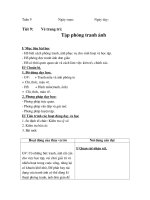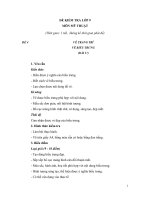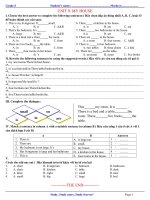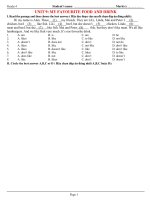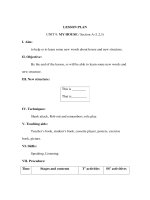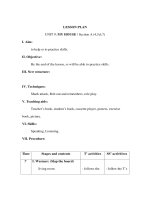DeDA HSGAnh 9 My ChauPhu My1011
Bạn đang xem bản rút gọn của tài liệu. Xem và tải ngay bản đầy đủ của tài liệu tại đây (130.45 KB, 11 trang )
<span class='text_page_counter'>(1)</span><div class='page_container' data-page=1>
<b>A. VOCABULARY AND STRUCTURES:</b>
<b>PART I: Choose the best option from A, B, C or D to complete the following sentences:</b>
<b>(2,0 ms)</b>
1. Peter used to ……… swimming every Friday when he was a student
A. went B. goes C. going D. go
2. He is not ………get married.
A. enough old to B. enough old for C. old enough to D. old enough for
3. My friend ……… me that he was going to take a driving test
A. spoke B. told C. said D. talk
4. The teacher advised the children ……… and see the dentist regularly
A. went B. going C. go D. to go
5. You will miss the last bus to school ……… you leave now.
A. unless B. until C. while D. till
6. Peter : “ I enjoy listening to pop music,”
Maria : “………”
A .I’m too B. I don’t C. Neither do I D. So am I
7. I asked my friend __________ he wanted to go out with me.
A. that B. which C. what D. if
8. I’m learning English ………I want to get a better job.
A. or B. but C. therefore D. because
9. I wish you ………to the theater last night , but you didn’t.
A. would come B. had come C. was coming D. came
10. Mike “ Would you like to have dinner with me ?”.
Jane : “………”
A. Yes, I’d love to B. Yes , so do I C. I’m very happy D. Yes, it is
11. After drinking a big bottle of ………_, he got drunk.
A. wine B. milk C. water D. orange juice
12. Michael : “ It’s hot in here”.
Tom : “……… I open the window ?”
A. Did B. Do C. Would D. Shall
13. Mary never cooks, ………?
A. did not she B. doesn’t she C. does she D. did she
14. I don’t study hard enough for the examination. I wish I ……… harder.
A. study B. studied C. have studied D. studies
15. She looks forward ………seeing her mother coming back soon.
A. to B. on C. with D. at
16. I am ………of making excuses for your rudeness to our friends.
A. annoyed B. worried C. tired D. angry
17. He finished the paintings …………for the exhibition.
A. in good time B. for the time being C. from time to time D. time after
time
18. Hello. Is that 21045? Please put me………to the manager.
A. across B. up C. over D. through
19. So little………..that the neighbors could not settle their differences.
A. they agreed B. agreed did they C. did they agree D. they did agree
20. Which do you want, this pen or that one? – I want……..
A. both B. all C. them D. other
<b>* Your answer:</b>
1……… 2……… 3………. 4………..
</div>
<span class='text_page_counter'>(2)</span><div class='page_container' data-page=2>
6……… 7……… 8………. 9………..
10………
11……… 12……… 13………. 14………..
15………
16……… 17……… 18………. 19………..
20………
<b>PART II: Each of the following sentences has one mistake. Identify the mistakes: (1,0 </b>
<b>m)</b>
1. My brother hasn’t played football for last year.
A B C D
2. Your new bicycle is more cheap than John’s .
A B C D
3. I am fond with jogging every morning .
A B C D
4. Do you mind to go out with her to buy some ice - creams?
A B C D
5. My brother said me to sit down at the table and do my homework .
A B C D
6. My father prefers watching films at home than going to the cinema .
A B C D
7. I’d like some informations about the flights to Lon Don tomorrow, please.
A B C D
8. I wish I can go with you to the seaside next weekend.
A B C D
9. The film was so bored that all audience had gone home before it ended .
A B C D
10. Jane asked me how did I go to school everyday.
A B C D
<b>* Your answer:</b>
1……….. 2………. 3………
4……….. 5………
6………. 7………. 8………..
9……….. 10………
<b>PART III: Fill in each gap in the sentence with the correct form of the word in capital </b>
<b>letters: (1,0 m)</b>
1. Vietnam declared its ________ on September 2nd<sub>, 1945. (DEPEND)</sub>
2. Food and clothing are ... of life (NECESSARY)
3. His dream is to be an ...like his father when he grows up.
(ECONOMY)
4. Japan is an ………country. (INDUSTRY)
5. She can find no ... to her financial troubles. (SOLVE)
6. The instructions are very... I am not clear what I should do.
(CONFUSE)
7. The large dog is perfectly ………...and he has never been known to attack
anyone. (HARM)
8. The party is …….…………, so you don’t have to dress up for it. (FORM)
9. Traveling in big cities is becoming more …………...…… everyday. (TROUBLE)
10. We should learn all the new words by heart in order to ……..…………. our vocabulary.
</div>
<span class='text_page_counter'>(3)</span><div class='page_container' data-page=3>
<b>* Your answer:</b>
1……….. 2………. 3………
4……….. 5………..
6………. 7………. 8………..
9……….. 10………
<b>PART IV: Put the appropriate forms / tenses of the verbs in brackets: (2,0 ms)</b>
Packet sugar from the supermarket (1. extract) ______ from either sugar cane or sugar beet.
These products (2. mix) ______ with hot water, which (3. dissolve) _____ their natural
sugar. Sugar (4. also find) ______ in fruit some of which, such as dates and grapes, (5.
contain) _____ very high amounts of sugar. To be a little more scientific, sugar should (6.
call) _____ sucrose. Sucrose (7. make up) ______ of two substances, glucose, which (8.
use) ______ for instant energy, and fructose, which (9. last) ______ longer as a source of
energy. The sugar in fruit is mainly fructose. So when we (10. eat) _____ fruit, we (11. also
eat) _____ quite large amounts of natural sugar. Some scientists (12. believe) ______ that
too much sugar (13. eat) ______ in sweets, cakes and biscuits. It (14. say) _____ to be
generally bad for the health, although nothing (15. definitely prove) ______ so far.
However, it (16. know) ______ that sugar (17. cause) _____ tooth decay. As one expert put
it: “If other foods (18. damage) _____ our body as much as sugar (19. damage) _____ our
teeth, they (20. ban) ______ immediately”.
<b>* Your answer:</b>
1……… 2……… 3………. 4………..
5………
6……… 7……… 8………. 9………..
10………
11……… 12……… 13………. 14………..
15………
16……… 17……… 18………. 19………..
20………
<b>B) READING:</b>
<b>PART I: Read the following passage and choose the best answer from A,B, C or D: </b>
<b>(1,0 m)</b>
If you enjoy cycling for pleasure, doing it in London can be a shock. There are not enough
lanes especially for bikes, and making your way through the traffic can be very dangerous.
But if you have great passion, cycling in London can be exciting, and it is an expensive way
of keeping fit if you live there. Some cyclists don’t mind spending a lot of money on
expensive bikes. However, if you just want a basic bike that is only for occasional use, there
are many cheap choices. Several markets have cheap bikes on sale which may not be
impressive to look at but should be satisfactory. You should buy a cycling helmet if you
want to cycle in London. Wearing a cycling helmet is not compulsory in Britain, but it is a
good idea to wear one for protection.
1. What is the main idea of the passage?
A. Cycling helmets C. Bicycle markets
B. Cheap bicycle D. Cycling in London
2. According to the passage, cycling in London is …………..
A. easy B. difficult C. tiring D. boring
3. The word “it” in line 4 refers to ………….
A. cycling B. doing exercise C. excitement D. passion
4. The difficulty of cycling in London is described in lines ………..
A. 2-3 B. 5 C. 5-6 D. 8-9
</div>
<span class='text_page_counter'>(4)</span><div class='page_container' data-page=4>
B. some bikes in London are cheap
C. there are not many lanes especially for bikes
D. some cyclists don’t want to buy expensive bikes.
<b>* Your answer:</b>
1……… 2……… 3………. 4………..
5………
<b>PART II: Read the passage and put one suitable word into each gap: (2,0 ms)</b>
Tourism was not always as important as it is today. In the past, ...(1)...wealthy people
could travel on vacations to other countries. But more people travel today ...(2)... in the past
because there is a growing middle class in many parts of the world. People now have more
money for travel. Special airplane fares for tourists make travel ...(3)... expensive and ...
<b>(4)... attractive than ever before. One person does not travel for the ...(5)... reason as</b>
another. But most people enjoy seeing countries that are different ...(6).... their own. They
also like to meet new people and ...(7)... new foods.
Tourism causes many ...(8)... in a country and in people's ...(9)... . People build new
hotels, restaurants and train men, women as tour ...(10)... to show tourists interesting places.
There are new night clubs and other attraction for visitors to entertain. International tourism
is really a big business.
<b>* Your answer:</b>
1……….. 2………. 3………
4……….. 5………..
6………. 7………. 8………..
9……….. 10………
<b>PART III: Read the following passage and then choose the word (A, B, C or D) that</b>
<b>best completes each blank: (2,0 ms)</b>
“My home is in the air – I do an enormous amount of traveling. It is a fast life and
…. (1) ….of work, but I like it and that is the only way …. (2)… me. Everything is tiring –
music, traveling – but what can I do? I am not …. (3)….to complaining. It is hard to
imagine now …. (4) … I will ever be very long in one place. My home town is on the
Caspian Sea. There is sea, wind, sun and … (5) … (many tourists and hotels. I have my own
flat with four or five rooms, but I am seldom there. If I am there for a day or two I prefer to
… (6) … with my mother and grandmother. They live in a small house, … (7) … it is very
comfortable and my mother cooks for me. I like good, simple food.
I have no wife, no brothers or sisters and my father … (8)… when I was seven. He
was an engineer and I don’t … (9)… him very well. He liked music very much and wanted
me to …. (10) … a musician.”
1. A. most B. full C. complete D. more
2. A. for B. to C. in D. by
3. A. wanted B. taken C. used D. known
4. A. and B. so C. while D. that
5. A. far B. too C. much D. more
6. A. stay B. go C. do D. spend
7. A. but B. since C. even D. which
8. A. killed B. gone C. passed D. died
9. A. know B. remember C. remind D. see
10. A. become B. turn C. develop D. grow
<b>* Your answer:</b>
1……….. 2………. 3………
4……….. 5………..
6………. 7………. 8………..
</div>
<span class='text_page_counter'>(5)</span><div class='page_container' data-page=5>
<b>PART IV: Read the passage and answer with true (T) / false (F) / not given (N): (1,0</b>
<b>m)</b>
<b> There are about 3000 living languages in the world, but only six of them are the most</b>
important ones. Two-thirds of the world’s population speaks those languages. More than
400 million people speak English as their mother tongue. Another 400 million speak it as a
second language. No one knows how many people speak it as a foreign language. Chinese is
the language with more speakers than English, but it is only the language for more than one
billion Chinese people. English is the official language on one-fifth of the land area in the
world. It is spoken in North America, Great Britain, Australia, and New Zealand. In South
Africa and India it is one of the official languages. In many countries, the textbooks in
universities are written in English. More than three-fourths of the world’s mail is composed
in English. More than three-fifths of the radio stations broadcast programs in English. More
than half of the scientific and research journals are in English. English is the language of
international communication.
1. Chinese is the most important language.
2. About 66.6 per cent of the world’s population speak six major languages.
3. Vietnamese speak English as their first language.
4. 75 per cent of the world’s mail is in English.
5. 40 per cent of the world’s radio stations use English.
6. English has more speakers than Chinese.
7. People in India speak English as their second language.
8. People in New Dehli cannot speak English.
9. People in France speak English as their foreign language.
10. People in Australia also speak English.
<b>* Your answer:</b>
1……….. 2………. 3………
4……….. 5………..
6………. 7………. 8………..
9……….. 10………
<b>PART V: Every sentence has one mistake. Correct these nine mistakes: (1,0 m)</b>
Thirteen-year-olds not spend as much money as their parents suspect - at least not according
to the findings of a recent survey, Money and Charge. The survey included three hundred
teenagers, 13-17 years old, from all over British. By the time they reach their teens, most
children see its weekly allowance rise dramatically to an amazing national average of
₤5.14.Two thirds think they get enough money, but most expect doing something to get it.
Although they have more cash, worry about debt is increasing between teenagers.
Therefore, the majority of children do an effort to save for the future. Greater access to cash
among teenagers does not, however, mean that they are more irresponsible as result. The
economic recession seems to have encouraged cautious attitudes to money, even in the case
of children in these ages. Instead of wasting what pocket money they have on sweets or
magazines, the 13-year-olds took part in the survey seem to respond to the situation by save
more than half of their cash.
<b>* Your answer:</b>
1……….. 2………. 3………
4……….. 5………..
6………. 7………. 8………..
9……….. 10………
</div>
<span class='text_page_counter'>(6)</span><div class='page_container' data-page=6>
<b>fits each gap. Remember that there are more sentences or phrases than needed. There</b>
<b>is an example for you: (1,0 m)</b>
Carnegie Hall, the famous concert hall in new York City, has again undergone a
restoration. While this is not the first, ………(0)
<b>………. As a result of this new restoration, Carnegie Hall once again</b>
has the quality of sound that it had when it was first built.
Carnegie Hall owes its existence to Andrew Carnegie, the wealthy owner of the steel
company in the late 1800s. The hall was finished in 1891
<b>………(1)………</b>
where accomplished musicians gained fame. Despite its reputation, however, the concert
hall suffered from several detrimental renovations over the years. During the Great
Depression, when fewer people could afford to attend performances,
<b>………(2)……….. As a result, a coffee shop</b>
was opened in one corner of the building, for which the builders replaced the brick and terra
cotta walls with windowpanes. A renovation in 1946 seriously
<b>………(3)………. when the markers of</b>
the film Carnegie Hall cut a gaping hole in the dome of the ceiling to allow for lights and
air vents. The hole was later covered with short curtains and a <b>fake ceiling, but the hall</b>
never sounded the same afterwards.
In 1960, ………(4)
<b>………. in restoring the hall after a group of real estate</b>
developer unveiled plans to demolish Carnegie Hall and build a high-rise office building on
the site. This threat spurred Stern to rally public support for Carnegie Hall and encourage
the City of New York to buy the property. The movement was successful, and the concert
hall is ………(5)……….. In the current
restoration, builders tested each new material for its sound qualities, and they replaced the
hole in the ceiling with a dome. The builders also restored the outer walls to their original
appearance and closed the coffee shop. Carnegie has never sounded better, and its prospects
for the future have never looked more promising.
Ex: 0 + E
<b>A. and quickly gained a reputation as an excellent performing arts hall </b>
<b>B. damage to the ceiling in Carnegie Hall</b>
<b>C. now owned by the city </b>
<b>D. Space in the building was sold to commercial businesses.</b>
<b>E. it is certainly the most extensive in the building’s history</b>
<b>F. the directors sold part of the building to commercial businesses </b>
<b>G. He performed on opening night in 1891</b>
<b>H. the violinist Isaac Stern became involved </b>
<b>K. damaged the acoustical quality of the hall </b>
<b>* Your answer:</b>
1……… 2……… 3………. 4………..
5………
<b>C) WRITING:</b>
<b>PART I: Finish each of the following sentences in such a way that it means exactly the</b>
<b>same as the sentences printed before it: (1,0 m)</b>
1. I should like someone to take me out to dinner.
What I should
………
………
</div>
<span class='text_page_counter'>(7)</span><div class='page_container' data-page=7>
Martin’s poor
………
……….
3. They’ll have to take the dog on holiday with them.
They can’t leave
………
………
4. My aunt got heavily stressed because her marriage broke up.
The break-up of the marriage ...
……….
5. I can’t believe that he passed the exam.
I find……….
………...
6. This is the fastest way to get to the city center.
There ………...
……….
7. If anyone succeeds in solving the problems, it will probably be him.
He is the most
………
……….
<b>8. While I strongly disapprove of your behavior, I will help you this time.</b>
Despite ...
<b>9. The underground is quick and cheap.</b>
The underground is ...
<b>10. He was annoyed because his secretary came late to work.</b>
He objected to ...
<b>PART II: Complete the second sentence so that it has the similar meaning to the first</b>
<b>sentence using the word given. Do not change the word given: (1,0 m)</b>
1) We arrived too late to see the first film. (enough)
...
2) “Would you mind not smoking in here?” The woman said to the man (rather)
...
3) He wrote the letter in two hours. (took)
...
4) “Why don’t we go out for a walk?” My father said. (suggested)
My father suggested ...
5) In spite of his age, Mr. Benson runs 8 miles before breakfast. (though)
...
6) It would be difficult for me to finish the work by the weekend. (difficulty)
...
7) Be sure to say goodbye to your grandmother before you leave. (without)
(Be sure not to leave without saying goodbye to your grandmother)
...
8) If I don’t leave now, I’ll miss the train. (unless)
...
9) You know a lot of people. (seem)
...
10) Tan looks nothing like his father. (take)
...
<b>PART III: Write a composiyion (200 words) about the following topic: (2,0 ms)</b>
</div>
<span class='text_page_counter'>(8)</span><div class='page_container' data-page=8>
<b></b>
<b>---</b>
<b>---</b>
<b></b>
<b></b>
<b></b>
<b></b>
<b></b>
<b></b>
<b></b>
<b></b>
<b></b>
<b></b>
<b></b>
<b></b>
<b></b>
<b></b>
<b></b>
<b></b>
<b></b>
<b></b>
<b></b>
<b></b>
<b></b>
<b></b>
<b></b>
<b></b>
<b></b>
<b></b>
<b></b>
<b></b>
<b></b>
<b></b>
<b></b>
<b></b>
<b>---PART IV: The following table shows the number of visitor arrivals to Tango from the </b>
<b>USA, Australia and France. Describe the table (200 words): (2,0 ms) </b>
Countries <b>The number of visitor arrivals to Tango</b>
<b>2007</b> <b>2008</b> <b>2009</b>
<b>The USA</b> 23,085 25,321 26,553
<b>Australia </b> 11,231 9,203 13,819
<b>France</b> 17,621 19,034 24,316
</div>
<span class='text_page_counter'>(9)</span><div class='page_container' data-page=9>
<b></b>
<b></b>
<b></b>
<b></b>
<b></b>
<b></b>
<b></b>
<b></b>
<b></b>
<b></b>
<b></b>
<b></b>
<b></b>
<b></b>
<b></b>
<b></b>
<b></b>
<b></b>
<b></b>
<b></b>
<b></b>
<b></b>
<b></b>
<b>---ANSWER FOR EHGLISH 9</b>
<b>A. VOCABULARY AND STRUCTURES:</b>
<b>PART I: Choose the best option from A, B, C or D to complete the following sentences:</b>
<b>(2,0 ms) (0,1 x 20)</b>
<b>1.D 2.C 3.B 4.D 5.A 6B 7.D 8.D 9.B 10.A </b>
<b>11.A 12.D 13.C 14.B 15.A 16.C 17.A 18.D</b> <b> 19.C</b> <b>20.A</b>
<b>PART II: Each of the following sentences has one mistake. Identify the mistakes: (1,0 </b>
<b>m) (0,1 x 10)</b>
1. D à since
2. Cà cheaper
3. B à of
4. A à going
5. Aà told
6. Cà to
7. B à information
8. B àcould go
9. B à boring
10. B à I went
<b>PART III: Fill in each gap in the sentence with the correct form of the word in capital </b>
<b>letters: (1,0 m) (0,1 x 10)</b>
1. independence 2. necessities
3. economist 4. industrial
5. solution 6.confusing
7. harmless 8. informal
</div>
<span class='text_page_counter'>(10)</span><div class='page_container' data-page=10>
<b>PART IV: Put the appropriate forms / tenses of the verbs in brackets: (2,0 ms)</b>
<b>(0,1 x 20)</b>
1. is extracted 2. are mixed 3. dissolves
4. is also found 5. contain 6. be called
7. is made up 8. is used 9. lasts
10. eat 11. also eat 12. believe
13. is eaten 14. is said 15. has been definitely proved
16. is known 17. causes 18. damaged
19. damages 20. would be banned
<b>B) READING:</b>
<b>PART I: Read the following passage and choose the best answer from A,B, C or D: </b>
<b>(1,0 m) (0,2 x 5)</b>
<b>1. D</b> <b>2. B</b> <b>3. A</b> <b>4. A</b> <b>5. A</b>
<b>PART II: Read the passage and put one suitable word into each gap: (2,0 ms)</b>
<b>(0,2 x 10)</b>
1. only 2. than 3. less 4. more 5. same
6. from 7. try 8. changes 9. lives 10. guides
<b>PART III: Read the following passage and then choose the word (A, B, C or D) that</b>
<b>best completes each blank. (2,0 ms) (0,2 x 10)</b>
1B 2A 3C 4D 5B 6A 7A 8D 9B 10A
<b>PART IV:. Read the passage and answer with true (T) / false (F) / not given (N): (1,0</b>
<b>m) (0,1 x 10)</b>
1. F 2. T 3. F 4. T 5. F
6. F 7. T 8. F 9. N 10. T
<b>PART V: Every sentence has one mistake. Correct these nine mistakes: </b>
<b>(1,0 m) (0,1 x 10)</b>
1. DO NOT spend 2. British - Britain
3. its –their 4. expect TO do
5. between – AMONG 6. do- MAKE an effort
7. result - A result. 8. in these- AT these
9. took part - WHO took part 10. save-saving
<b>PART VI: Youe are going to read a passage about Carnegie Hall. Six sentences or</b>
<b>phrases have been removed from the passage. Choose the sentences A-K the one which</b>
<b>fits each gap. Remember that there are more sentences or phrases than needed. There</b>
<b>is an example for you: </b>
<b>(1,0 m) (0,2 x 5)</b>
<b>1.A</b> <b>2.F</b> <b>3.K</b> <b>4.H</b> <b>5.C</b>
<b>C) WRITING:</b>
<b>PART I: Finish each of the following sentences in such a way that it means exactly the</b>
<b>same as the sentences printed before it: (1,0 m) (0,1 x 10)</b>
1. What I should like is being/ to be taken out to dinner.
2.Martin’s poor health doesn’t / can’t prevent / stop him (from) enjoying life.
3.They can’t leave their dog behind when they go/are on holiday.
4.The break-up of the marriage made my aunt heavily stressed.
5.I find it hard to believe that he passed the exam.
6.There’s no faster way than this to get to the city center.
7.He is the most likely person to succeed in solving the problems.
</div>
<span class='text_page_counter'>(11)</span><div class='page_container' data-page=11>
<b>9. The underground is not only quick but also cheap.</b>
<b>10. He objected to his secretary(’s) coming late to work/ the fact that his secretary came late</b>
to work.
<b>PART II: Complete the second sentence so that it has the similar meaning to the first</b>
<b>sentence using the word given. Do not change the word given: (1,0 m) (0,1 x 10)</b>
1. We didn’t arrive early enough to see the first film.
2. I’d rather you didn’t smoke in here
3. It took him 2 hours to write the letter.
4. My father suggested we should go out for a while.
going out for a while.
5. Though Mr. Benson is old, He runs 8 miles before breakfast.
6. I would have difficulty in finishing the work by the weekend.
7. Be sure not to leave without saying goodbye to your grandmother.
8. I’ll miss the train unless I leave now.
9. You seem to know a lot of people.
10. Tan doesn’t take after his father at all.
<b>PART III: Write a composiyion (200 words) about the following topic: (2,0 ms)</b>
<b>THE IMPORTANCE OF CONFIDENCE</b>
<b>(Giám khảo chấm theo ý bài làm của học sinh)</b>
<b>-</b> <b>Nội dung: 1,5 đ</b>
<b>-</b> <b>Ngữ pháp: 0,5 đ</b>
<b>PART IV: The following table shows the number of visitor arrivals to Tango from the </b>
<b>USA, Australia and France. Describe the table (200 words): (2,0 ms) </b>
<b>(Giám khảo chấm theo ý bài làm của học sinh)</b>
<b>-</b> <b>Nội dung: 1,25 đ</b>
<b>-</b> <b>Ngữ pháp: 0,5 đ</b>
<b>-</b> <b>Hình thức: 0,25 đ</b>
<b>...The end!...</b>
<b>...The end!...</b>
Người ra đề
</div>
<!--links-->
